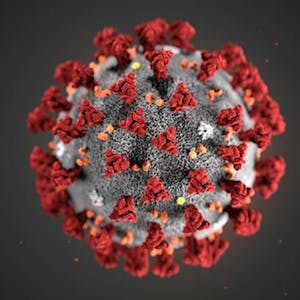Welcome to 'Science Matters: Let's Talk About COVID-19' – a vital course from the Jameel Institute at Imperial College London. This comprehensive program delves into the science behind COVID-19 and its spread, offering insights into epidemiology, infectious disease modeling, health systems, community engagement, virology, and clinical presentations.
Throughout the course, you will have the opportunity to learn from world-class experts as they address key questions about the pandemic, the role of communities, and the global response. The modules cover a range of topics including understanding the scale of the outbreak, tracking trends, evidence-based outbreak control methods, the importance of community involvement, multidisciplinary working, and global cooperation in outbreak response.
This course is continuously updated to reflect the latest insights and developments in the COVID-19 situation. Please note that the information provided is for educational purposes only and should not be used as clinical or other advice.
Certificate Available ✔
Get Started / More Info
The course modules provide in-depth insights into the COVID-19 pandemic, covering topics such as epidemiology, infectious disease modeling, health systems, community engagement, virology, and clinical presentations.
Welcome to the Introduction to Science Matters: Let's Talk About COVID-19 module. This module provides an overview of the course and insights into tracking trends and finding reliable sources of information about COVID-19.
The COVID-19 Situation Reports module offers regular updates on the ongoing state of the epidemic, delivered by experts. It also covers key definitions in infectious diseases epidemiology and reports on the impact of non-pharmaceutical interventions.
The How to Forecast an Epidemic module delves into epidemiology and infectious disease modeling, covering essential topics such as the basic reproduction number, case fatality ratio, and international surveillance of COVID-19.
Explore the Health Systems and Economic Impacts module to gain insights into capacity planning, financing epidemic responses, and the direct and indirect effects of pandemics on low and middle-income countries.
The Community Engagement and Response module provides valuable perspectives on community participation, engagement, and strategies, drawing lessons from past outbreaks such as the Ebola outbreak in West Africa.
The Virology of COVID-19 module offers an in-depth understanding of the virus, its genetics, replication cycle, testing approaches, and the differences between SARS-CoV-2 and influenza viruses.
Delve into the Clinical Presentations of COVID-19 module to learn about the clinical features of COVID-19, emerging therapies, and the treatment of the disease.
The Summary Module provides a comprehensive overview of the key concepts covered in the course, along with insights into evolving research and new questions arising from the COVID-19 pandemic.
This specialization equips public health professionals and researchers with the skills to design and implement effective qualitative studies and analyze qualitative...
Design and Conduct of Clinical Trials equips learners with essential skills to design and implement clinical trials while ensuring bias control, randomization, ethical...
Infection Prevention in Nursing Homes equips healthcare professionals with knowledge and strategies to combat the spread of infections, including antibiotic-resistant...
This course explores the intricacies of building alliances in global health, using the Global Polio Eradication Initiative as a case study. Participants will delve...